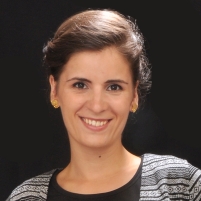|
| Neurobehavioral Biomarkers of Autism Spectrum Disorder |
| Monday, May 25, 2020 |
| 9:00 AM–9:50 AM EDT |
Virtual |
| Area: AUT |
| Chair: Corina Jimenez-Gomez (Auburn University) |
| CE Instructor: Corina Jimenez-Gomez, Ph.D. |
| Presenting Author: GABRIELA ROSENBLAU (George Washington University) |
| Abstract: Advances in genetics, molecular biology, and cognitive neuroscience offer hope for personalized treatment and improved outcomes in those with autism spectrum disorder (ASD). However, the promise of precision medicine is limited by a lack of mechanistic models that explain phenotypic and etiological heterogeneity; instead of using such models to identify subgroups likely to respond to specific treatments, the field relies on service availability, trial-and-error, and clinical judgment to make treatment decisions. In line with the computational psychiatry objective, my research integrates mathematical models of behavior and brain activity to establish neurocognitive models that can successfully predict individual social and nonsocial learning profiles. Specifically, I am formally comparing the suitability of various computational models to capture selective deficits in social learning of individuals with ASD, as well as variability in both social and nonsocial learning across typically developing youth and those with ASD. Identifying how these model-based predictions are implemented in the brain will allow us to identify neural architecture underlying learning in therapeutically relevant contexts. The long-term goal of this research line is to apply these computational models to inform, refine, and individualize diagnosis, education, and treatment of youth with ASD. |
| Target Audience: Board certified behavior analysts; licensed psychologists; graduate students. |
| Learning Objectives: PENDING |
| |
| GABRIELA ROSENBLAU (George Washington University) |
 I am an Assistant Professor of cognitive neuroscience in the Psychology department at George Washington University (GWU). I am also affiliated with the Autism and Neurodevelopmental Disorders Institute at GWU. My research combines computational and neuroscientific methods to understand the neurobiological mechanisms underlying learning in neurotypical and clinical populations, especially autism spectrum disorder. I have expertise in designing naturalistic tasks to assess social decision making in behavior and brain function, conducting longitudinal clinical studies, computational modeling and developmental cognitive neuroscience. I have recently been awarded the Bridge to Independence Award by the Simons Foundation for Autism Research to study learning in autism with a computational neuroscientific approach and its implications for treatment. |
|
| |
| |
|
| The Influence of Social Synchrony and Social and Motor Context on Social Communication, Social Interaction, and Restricted and Repetitive Behaviors in Autism |
| Monday, May 25, 2020 |
| 9:00 AM–9:50 AM EDT |
Virtual |
| Area: EAB |
| Chair: Karen M. Lionello-DeNolf (Assumption College) |
| CE Instructor: Karen M. Lionello-DeNolf, Ph.D. |
| Presenting Author: PAULA FITZPATRICK (Assumption College) |
| Abstract: Autism spectrum disorder (ASD) is marked by social communication and interaction impairments and restricted and repetitive behaviors (RRBs), yet little is understood about the etiology of these impairments and there are few successful treatment interventions. The expression and severity of social impairments can vary widely across individuals, so more objective bio-behavioral markers that measure the process of how interactions unfold over time will greatly enhance our understanding and could lead to targeting of interventions to particular subgroups of patients. Engagement in restrictive and repetitive behaviors can compound the social communication and interaction difficulties, so a fuller understanding of the contextual factors that influence the expression of RRBs is also need. In this talk, I argue that social synchrony may be a useful dynamic bio-marker of social ability in children and adolescents with ASD. The relevance of social synchrony and coupled oscillator-based modeling of synchronization for understanding social impairment in ASD will be discussed and synchronization ability for spontaneous and intentional interpersonal coordination in children and adolescents with and without ASD will be compared. In addition, I will present data that evaluates the relationship between synchronization ability and more traditional clinical and social cognitive measures of social ability and evaluate the influence of social and motor context on the presentation of RRBs and language production during conversation. Finally, the promise of social synchronization ability for providing a measure with heightened resolution to identify the essential qualities of social performance in naturalistic situations and isolate underlying neural mechanisms that may be disrupted in ASD will be discussed and directions for future research and potential interventions outlined. |
| Target Audience: Board certified behavior analysts; licensed psychologists; graduate students. |
| Learning Objectives: At the conclusion of the presentation, participants will be able to: (1) illustrate the relevance of social synchrony and coupled oscillator-based modeling of synchronization for understanding social communication and interaction impairment in autism spectrum disorder; (2) Compare synchronization ability for spontaneous, intentional, interpersonal coordination during social-motor tasks and during conversation in children and adolescents with and without ASD using both behavioral and neural measures; (3) Explain the relationship between synchronization ability and traditional measures of social cognition; (4) Demonstrate the importance of social and motor context in influencing RRB presentation and language production and discuss its use for interventions; (5) Describe the application of social synchronization as a potential early biobehavioral marker and treatment intervention for ASD. |
| |
| PAULA FITZPATRICK (Assumption College) |
 My research focuses on understanding how bodily movement tunes psychological development by exploring the impact of motor behavior on social, cognitive, and emotional developmental outcomes from infancy through adolescence. In particular, current projects focus on understanding the relationship between motor coordination and social skills, the contribution of social coordination to social problems in autism, the factors (at the level of the child and family) that influence the development of motor skill, and the relationship between motor skill and early learning and academic success. My research derives from dynamical systems theory that emphasizes self-organizing principles of stability, instability, and behavioral transitions to understand the emergence and progression of behavior. My approach involves measuring behavior across multiple domains (motor, social, cognitive, emotional) and at a number of scales—observable behavioral coding, micro-dynamical time-series measures, and, more recently, neurobiological measures. My research employs innovative, multi-method research designs and the formation of collaborative research teams with diverse backgrounds that cut across disciplinary expertise—developmental psychology, clinical psychology, social psychology, movement science, neuroscience, and education—and has important implications for translating new knowledge about social, cognitive, and motor development into treatments and interventions to help struggling children and families. My research focuses on understanding how bodily movement tunes psychological development by exploring the impact of motor behavior on social, cognitive, and emotional developmental outcomes from infancy through adolescence. In particular, current projects focus on understanding the relationship between motor coordination and social skills, the contribution of social coordination to social problems in autism, the factors (at the level of the child and family) that influence the development of motor skill, and the relationship between motor skill and early learning and academic success. My research derives from dynamical systems theory that emphasizes self-organizing principles of stability, instability, and behavioral transitions to understand the emergence and progression of behavior. My approach involves measuring behavior across multiple domains (motor, social, cognitive, emotional) and at a number of scales—observable behavioral coding, micro-dynamical time-series measures, and, more recently, neurobiological measures. My research employs innovative, multi-method research designs and the formation of collaborative research teams with diverse backgrounds that cut across disciplinary expertise—developmental psychology, clinical psychology, social psychology, movement science, neuroscience, and education—and has important implications for translating new knowledge about social, cognitive, and motor development into treatments and interventions to help struggling children and families. |
|
| |
| |
|
| Scaling Up Behavioral Therapy for Public Health: The Case of Acceptance and Commitment Therapy for Stopping Cigarette Smoking |
| Monday, May 25, 2020 |
| 10:00 AM–10:50 AM EDT |
Virtual |
| Area: CSS |
| Chair: Thomas G. Szabo (Florida Institute of Technology) |
| CE Instructor: Thomas G. Szabo, Ph.D. |
| Presenting Author: JONATHAN BRICKER (University of Washington) |
| Abstract: Despite the rise of nicotine vaping and its recent public scares, cigarette smoking remains the single most preventable cause of premature death in the USA and for many other parts of the world. Smoking kills over 7 million people a year. Smoking fits well with the principles of applied behavior analysis because it is a highly repetitious behavior maintained by its consequences. Early applications of functional analysis and conditioning led to promising treatments for helping people stop smoking but as group and individual face-to-face therapies they were hampered high intensity, cost, and low scalability. Fortunately, the rise of digital technologies and telehealth has a recreated the ability for provide behavioral therapies for smoking cessation on a broad scale at lower cost. Acceptance and Commitment Therapy (ACT), a contemporary form of clinical behavior analysis based on Skinner’s philosophy of Radical Behaviorism, is becoming a prominent therapeutic approach to digital and telehealth delivered smoking cessation. ACT teaches functional analysis, present moment awareness, and values-based living to help people cope with urges and stay committed to living smoke free. I will show how my research team translates ACT principles into concrete and highly accessible treatment programs on platforms including telephone-delivered behaviorial coaching, websites, smartphone apps, and chatbots for smoking cessation. This translational research is an iterative process of expert clinician input, user testing, and rapid prototyping. Once developed, we test each of these delivery platforms in both small and large-scale randomized controlled trials comparing the ACT program with standard cognitive behavioral programs. I will share the latest results of these trials and how our interventions have already reached over 50,000 people. I will close with highlighting the future directions of our research, including applications to treatment of obesity. |
| Target Audience: Board certified behavior analysts; licensed psychologists; graduate students. |
| Learning Objectives: At the conclusion of the presentation, participants will be able to: (1) describe how Acceptance and Commitment Therapy (ACT) is scaled up as a broad reaching public health technology intervention; (2) apply certain ACT and contextual behavioral principles for tobacco cessation and other addictive behaviors; (3) discuss latest research findings on ACT for tobacco cessation, and their impact on Washington State-level tobacco policy. |
| |
| JONATHAN BRICKER (University of Washington) |
 Dr. Jonathan Bricker’s passion is to scale up behavioral therapies into high reach public health intervention programs. He is an internationally recognized scientific leader in the behavioral therapy called Acceptance and Commitment Therapy (ACT). He focuses ACT on skills for self-control, particularly for quitting smoking and other addictions. His programs have been developed and tested on many platforms, including apps, chatbots, websites, and telephone coaching that reach thousands of people daily. Rather than encouraging people to ignore cravings, his approach to ACT is to focus on becoming aware of triggers for cravings and choosing not to act on them. His smoking cessation programs have achieved success rates that are double that of other programs—cutting cigarette use by 75 percent. Dr. Bricker has over 85 scientific publication and has received $14 million in US Government NIH grants, predominantly for WebQuit, iCanQuit and the TALK study of Acceptance and Commitment Therapy for smoking cessation. His research and expert testimony was instrumental in Washington State passing a law to increase the minimum age of tobacco sales to 21.
He founded and leads the Health And Behavioral Innovations in Technology lab (which goes by the apt acronym: HABIT), which is part of the Public Health Sciences Division, at the Fred Hutch Cancer Research Center in Seattle, Washington. Dr. Bricker’s expertise in his field has led him to his current role of senior editor of the journal, Addiction. His TEDx talk, “The Secret to Self-Control” has been viewed nearly 5 million times, and has been translated into ten languages. |
|
| |
| |
|
 Climate Change Demands Behavioral Change: Giving the Future a Chance Climate Change Demands Behavioral Change: Giving the Future a Chance |
| Monday, May 25, 2020 |
| 4:00 PM–4:50 PM EDT |
Virtual |
| Area: SCI |
| Chair: Cynthia J. Pietras (Western Michigan University) |
| CE Instructor: Cynthia J. Pietras, Ph.D. |
| Presenting Author: ELKE WEBER (Princeton University) |
| Abstract: Bounded rationality and finite processing capacity result in homo sapiens focusing attention first on the here and now. But many individual and social problems require attention to future costs and benefits, with climate change the most urgent challenge for decisions that fully and justly weigh immediate and certain costs and benefits of business-as-usual or greenhouse gas mitigation efforts against delayed, risky, and often disputed costs and benefits. Psychological theories from prospect theory to hyperbolic discounting and query theory predict that future costs of business-as-usual and future benefits of GHG mitigation efforts will typically get short thrift in such decisions. I present data for three interventions that focus greater attention on future consequences and thus provide entry points for choices that better balance short- and long-term goals and objectives. (1) In trade-offs between immediate and delayed consumption, discounting of future consequences is reduced when choice options with future benefits are made the default and when decision makers are prompted to consider arguments for such choices first (Weber et al., 2007). (2) Individual and country-level data show that citizens may use perceptions of their country’s age to predict its future continuation, with longer pasts predicting longer futures, and longer futures justifying greater investments into sustainability. Thus, framing a country as a long-standing entity can promote pro-environmental behavior (Hershfield, Bang, & Weber, 2014). (3) Finally, individuals’ motivation to leave a positive legacy can be leveraged to increase engagement with climate change and other environmental problems (Zaval, Markowitz & Weber, 2015). |
| Target Audience: Anyone interested in behavior and behavior change. |
| Learning Objectives: At the conclusion of the presentation, participants will be able to: (1) define the concept of status-quo bias and provide examples of it; (2) identify at least one cognitive and one motivational reason for status-quo bias; (3) create ways of helping decision makers overcome their status-quo bias in a specific situation. |
| |
| ELKE WEBER (Princeton University) |
 Elke Weber is the Gerhard R. Andlinger Professor in Energy and the Environment and Professor of Psychology and Public Affairs at Princeton University. Her research models decision-making under uncertainty and time delay in financial and environmental contexts from a psychological and neuroscience perspective. Her expertise in the behavioral decision sciences has been sought out by advisory committees of the National Academy of Sciences on Human Dimensions in Global Change, an American Psychological Association Task Force that issued a report on the Interface between Psychology and Global Climate Change, and Working Group III for the 5th and 6th Assessment Report of the U.N. Intergovernmental Panel on Climate Change (IPCC). She is past president of the Society for Neuroeconomics, the Society for Judgment and Decision Making, and the Society for Mathematical Psychology. She is a fellow of the American Academy of Arts and Sciences, the American Association for the Advancement of Science, the American Psychological Association, the Association for Psychological Science, the Society for Risk Analysis, the Society for Experimental Psychology. She received the Distinguished Scientific Contribution Award from the Society for Risk Analysis and was also elected to the German National Academy of Sciences. |
|
| |